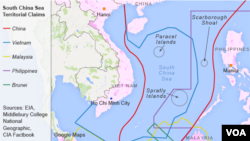The leaders of Asean’s 10 member states are preparing for a major summit in Malaysia at the end of the month, where they expect to stress the resolution of the South China Sea dispute with China through peaceful means, according to draft documents prepared for the summit.
According to a draft of the chairman’s statement, Asean will call for restraint and the avoidance of “actions that would complicate or escalate tension.” They will also emphasize the need for a code of conduct to be established.
The Asean summit will take place in Kuala Lumpur on Nov. 21, but typically many of the decisions announced from the summit are agreed upon ahead of time. Malaysia is the chair of Asean this year, as part of a rotation.
“We stressed the commitment of Asean Member States to ensure the full and effective implementation of the Declaration on the Conduct of Parties in the South China in its entirety and emphasized the need for the establishment of the Code of Conduct in the South China Sea,” according the statement.
Kung Phoak, president of the Cambodian Institute for Strategic Studies, said the South China Sea dispute will take a lot of time to resolve, so a code of conduct in the meantime can help decrease tension. Several Asean states have overlapping claims to the sea with China.
“The main goal of [the code] is to prevent conflicts and armed disputes and to avoid the tension and instability which may be stepping up the conflict,” he said. The code of conduct is a common interest of Asean, China and the US, he added. Cambodia has contributed much to peaceful solutions, he said.
However, John Ciorciari, a public policy professor at the University of Michigan, said Asean’s “consensus-based diplomacy” makes it difficult to agree on a collective position on the South China Sea.
Key Asean governments outside the Philippines and Vietnam—two major claimants—need to demonstrate “the willingness to impose meaningful costs on Beijing,” he said. “Even an Asean leaders’ statement criticizing China’s island-building campaign probably would not stop the reclamation. Driving discussions back into diplomatic channels where compromise is possible will require convincing Chinese leaders that pressing ahead militarily will not serve their interests.”








